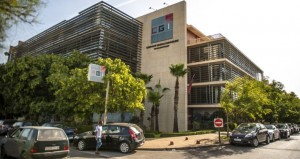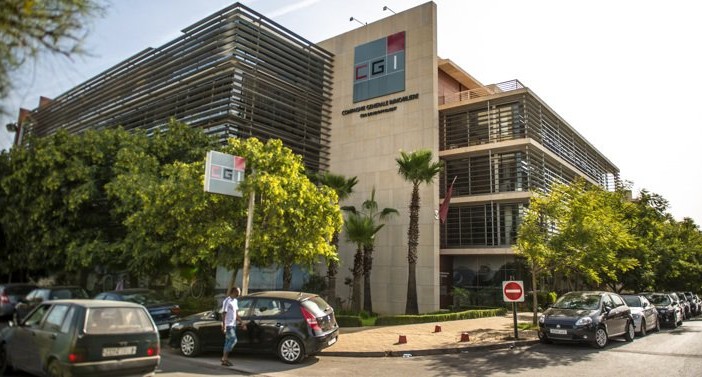The Africa Report
by Nadia Rabbaa

CGI’S RABAT HEADQUARTERS WERE A SCENE OF DRAMA ON 16 OCTOBER WHEN POLICE BURST IN TO ARREST MANAGING DIRECTOR ALI GHANNAM. PHOTO©HASSAN OUAZZANI FOR JA
The company’s stock is being removed from the market, and two top managers have lost their jobs in the scandal of the Madinat Badès real estate project.
Investigations into a troubled real estate project in northern Morocco have led to the announced delisting of a major state-owned firm and a shake-up in the leadership of the Caisse de Dépôt et de Gestion (CDG), a state-run financial institution.
It happened so suddenly. The police entered the building in broad daylight. They went straight to Ghannam’s office
On 16 October, the CDG, parent company of CDG Développement, which owns a majority stake in the Compagnie Générale Immobilière (CGI), announced the suspension of trading of the CGI’s stock due to the government’s discovery of mismanagement at the company.
The day before, CGI managing director Ali Ghannam and CDG managing director Anas Alami – both of whom were later sacked – appeared with some 20 other officials before a judge in Fez following an investigation into embezzlement at the Madinat Badès project in the city of Al Hoceima.
To buy time to reform the company, CDG Développement is now planning to buy back all outstanding CGI shares that it does not already own, a move that will hurt its bottom line and investment budget.
Chilly at the palace
The planned purchase of the publicly held CGI shares has damaged investor confidence and is a symptom of a growing cold war between power brokers in King Mohammed VI’s palace.
The two camps in the conflict are led by Mounir Majidi, member of the royal cabinet and personal secretary to the king, and Fouad Ali El Himma, founder of the Parti Authenticité et Modernité and a senior adviser of the king.
El Himma usually focuses on politics, leaving economic questions to Majidi, who is also head of SIGER, the parent company of royal holding SNI (Sociéte Nationale d’Investissement).
Insiders say, however, that El Himma had been hoping for a long time to see a change in the upper management of the CGI, known to be the domain of ‘Majidiboys.’
The CDG plays an influential role in Morocco’s financial sector as the country’s largest institutional investor.
Recently, it has participated in the financing of several large projects including the Tanger Med port and Tanger Automotive City.
Alami was appointed to lead the CDG in 2009 with a mandate to reorganise and restructure its operations in order to avoid repeats of the major losses it suffered through unsuccessful investments in tech company Nemotek Technologie and tourism outfit Club Med.
The CDG and its real estate subsidiary are now under in- creased scrutiny.
Mohammed VI replaced the CDG’s Alami on 29 January with Abdellatif Zaghnoun, the former director general of taxation.
Zaghnoun is said to be an ally of El Himma, suggesting his side is winning favour in the battle for influence.
The Cour des Comptes, Morocco’s auditor general, announced in December that the group will be the subject of an intense programme of investigations.
The CGI’s troubles are set to continue, too.
In December, the company announced it was revising its projected turnover for 2014 to Dh2.7bn ($282m), a fall of 28% from the previous year, which it blamed on project delays and other problems.
Delays at the Madinat Badès development ultimately led to the CGI’s announced delisting. The project has had a history of delays, as have many others in the region.
Started in 2003, Madinat Badès was supposed to involve the construction of 2,100 housing units on 54ha. Only a dozen hectares have since been developed.
Contractors did not respect building specifications, contributing to the delays and cost overruns.
Those who purchased units in the development, mainly Moroccans living in Europe, complained to the royal palace last year about the sloppiness of the work.
On 23 August, King Mohammed VI asked the finance and interior ministries to investigate Madinat Badès and other CGI projects in the north, including projects in Tangier and Nador.
With the first results of the probe in the hands of the authorities, police officers arrested managing director Ghannam on the CGI premises on 16 October.
A CGI employee who requested anonymity sets out the scene: “It happened so suddenly. The police entered the building in broad daylight. They went straight to Ghannam’s office.
“Nobody understood what was happening. We knew that there was an investigation, but we would never have expected to see the managing director arrested like that.”
An employee at parent company CDG told The Africa Report that the CGI scandal is creating confusion in the market: “If you understand what is happening, please let us know because we don’t.
“I mean, all of a sudden we lost the top of our upper management. It is now such an internal mess to deal with.
Moreover, the CGI had a big market capitalisation and it [the arrest] happened in a phase where we needed to reassure investors.
“It created a crisis in trust that impacted the CGI’s image and economic results. We were on such a positive trend in 2014. We even announced a corporate bond issue of Dh1.5bn in June last year.
“How can the real estate projects of the group keep going on as before if we’ve lost our clients’ trust?”
Devastating blow
The CGI has successfully developed projects in Casablanca, Marrakech and Rabat. It has also been a key player in the government’s rehousing programme to transfer families from slums to social housing units.
The CGI’s stock will be delisted once it can come up with a buyout figure for the 15.4% shareholding held by small investors and the 8.5% owned by insurance company RMA Watanya.
The CGI’s share price was Dh725 on 16 October, the day it was suspended.
The stock market authorities rejected the CGI’s first buyout offer on 13 January and called for a second independent evaluation to better determine a fair value for the shares.
The buyback will be a devastating blow for the CGI.
If the shares are purchased at the 16 October price, it will cost the company approximately Dh2bn, a sum greater than its turnover last year.
To reduce the backlog in CGI projects and purchase land for development along the Rabat-Casablanca corridor, the company had planned to spend at least Dh27.4bn over the period of 2013-2016.
Such spending may no longer be possible.
The news is also a blow for the wider financial sector, especially at a time when the government is focused on building up Casablanca Finance City.
Meanwhile, the cases related to Ghannam and Alami are ongoing, and they are due to reappear before the judges in Fez in May.







